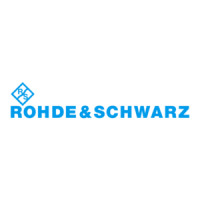Getting Started
R&S
®
SMA100B
51User Manual 1178.3834.02 ─ 05
● Possible Ways to Operate the Instrument...............................................................51
● Means of Manual Interaction...................................................................................51
● Understanding the Display Information...................................................................52
● Accessing the Functionality.....................................................................................55
● Entering Data.......................................................................................................... 56
● Getting Information and Help.................................................................................. 57
● Remote Control.......................................................................................................59
● Remote Operation over VNC.................................................................................. 60
2.4.1 Possible Ways to Operate the Instrument
There are three ways to operate the R&S SMA100B:
●
Manual operation:
Use the touchscreen, hard keys and rotary knob, or an optional mouse and/or key-
board.
The description under Chapter 2.4, "Instrument Control", on page 50 shows how to
operate the instrument manually.
●
Remote control:
Create programs to automatize repeating settings, tests and measurements. The
instrument is connected to a computer running the program.
This way of operation is described in Chapter 12, "Network Operation and Remote
Control", on page 346.
●
Remote operation from a computer:
Remote monitoring and control of the instrument from a connected computer is
based on the common cross-platform technology VNC (Virtual Network Comput-
ing). On the remote computer, any standard web browser (supporting Java) or a
dedicated VNC client (like Ultr@VNC) can be used. See also Chapter 2.4.8,
"Remote Operation over VNC", on page 60.
2.4.2 Means of Manual Interaction
For the manual interaction with the R&S SMA100B, you have several methods that you
can use as an alternative to perform a task:
●
Touchscreen:
Touchscreen operation is the most direct way to interact. Almost all control ele-
ments and actions on the screen are based on the standard operating system con-
cept. You can tap any user interface element to set parameters in dialog boxes,
enter data, scroll within a dialog etc., as if you work with a mouse pointer.
Tapping the screen works like clicking mouse buttons:
– Touch quickly = click: Selects a parameter or provokes an action.
– Touch and hold = right-click: Opens a context-sensitive menu.
– Touch and swipe = drag: Scrolls through the contents of a display element
larger than the screen, e.g. a list or a table.
●
Function keys and rotary knob:
The front panel provides nearly all functions and controls to operate the instrument
in the classic way, without touchscreen.
Instrument Control

